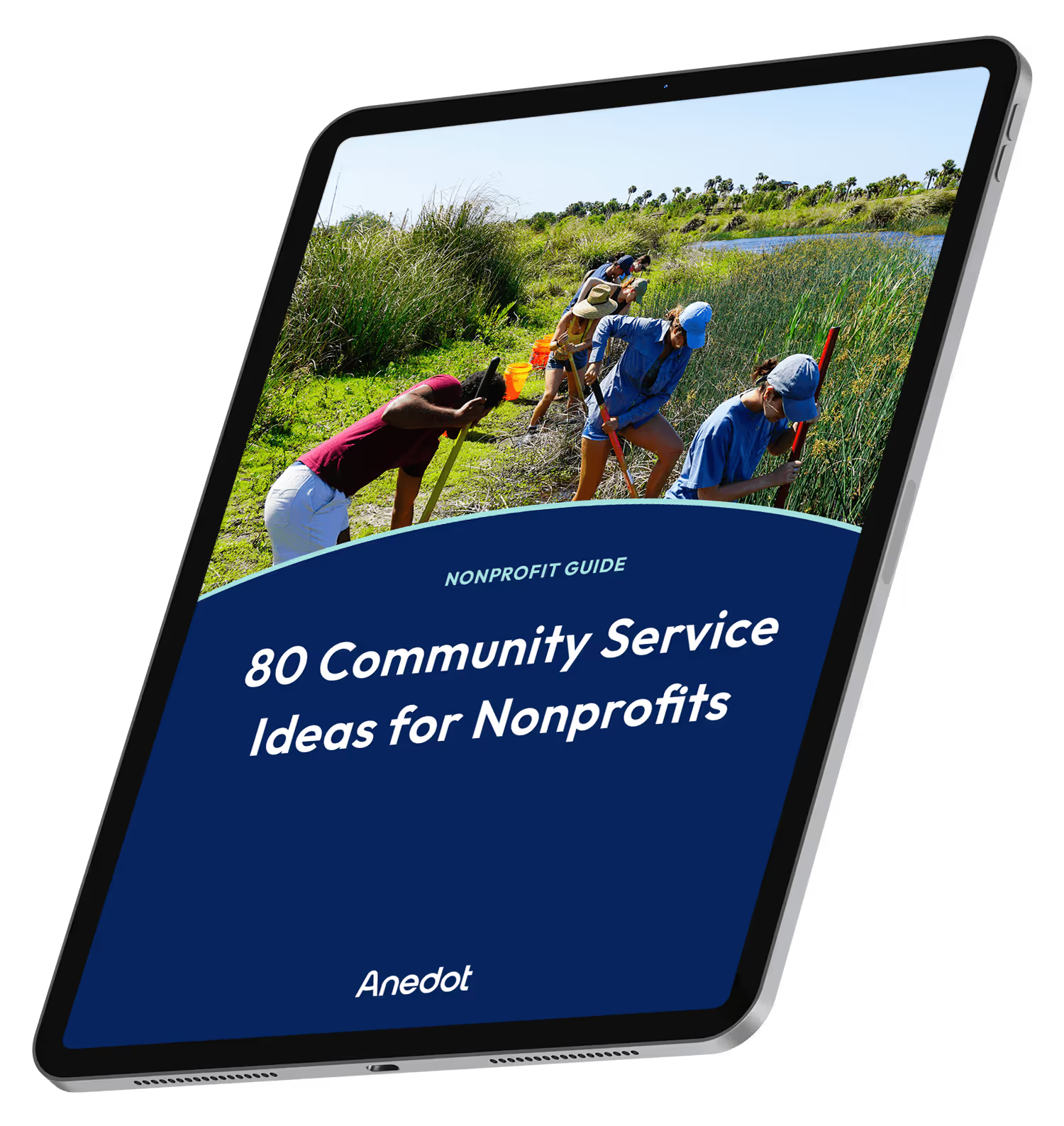Community service is an essential aspect of building a strong and vibrant community.
Nonprofit organizations and individuals have a unique opportunity to make a positive impact in their community by providing volunteer opportunities and creating meaningful service projects and programs.
Here is a list of 80 community service ideas for nonprofit organizations and individuals.
1. Host a donation drive for a specific need in the community

Hosting a donation drive is a great way to help meet specific needs within the community.
The organization can identify a specific need such as clothing, food, or household items, and then work to collect donations from individuals and businesses within the community.
The donations can be collected at designated drop-off locations, and can be promoted through various media channels such as social media, flyers, and local newspapers.
The drive can also be held in conjunction with an event, such as a community fair or concert, to increase visibility and participation.
This can help to raise awareness of the organization's mission, and also help those in need within the community.
2. Organize a community clean-up day
Organizing a community clean-up day is a great way to make a positive impact on the community while also raising awareness for the organization's mission.
The event can be organized and run by volunteers from the organization, with the help of community members who are passionate about keeping the area clean.
The event can be held in a public area like a park or neighborhood, where the organization can work to clean up litter, plant flowers, remove graffiti and other activities that improve the appearance of the community.
This event not only improves the community but also it helps the nonprofit to raise awareness and funds for their cause while promoting a sense of pride and ownership among residents.
3. Support local businesses
Supporting local businesses can be a great way to make a positive impact on the community by promoting economic development and sustainability.
This can be done through a variety of initiatives, such as organizing a community-wide "shop local" campaign, partnering with local businesses to offer discounts or special promotions to members of the community, or hosting events that showcase local businesses and their products or services.
By supporting local businesses, the nonprofit can help to create jobs, stimulate economic growth, and foster a sense of community pride.
Additionally, by promoting the use of local businesses, the organization can help to preserve the unique character and diversity of the community.
4. Work with other local charities and nonprofit organizations
Collaboration is key to making a bigger impact in the community. By working together with other organizations, you can share resources, knowledge, and skills to achieve common goals.
This can help to build a stronger community and make a more significant impact on the issues you care about.
Forming partnerships with other organizations can also increase your organization's visibility and credibility, which can lead to more donations, volunteer recruitment, and volunteer engagement.
5. Support seniors in the community

As the population ages, it is becoming increasingly important to support and care for seniors in the community.
Whether it's providing assistance with daily tasks, offering companionship, or helping to improve their overall quality of life, there are many ways to support seniors in your community.
6. Help the local homeless population
Homelessness is a serious problem in many communities and there are many ways to help those who are struggling with homelessness.
Whether it's providing basic necessities like food and clothing, offering job training or education, or providing housing and support services, there are many ways to make a difference in the lives of homeless individuals and families.
7. Start a community garden
Community gardens can provide a source of fresh produce for low-income families, as well as a place for community members to come together, learn about gardening, and take pride in their neighborhood.
By starting a community garden, your organization can help to promote healthy eating, physical activity, and community development.
Additionally, community gardening can provide educational opportunities, improve mental health and decrease crime and vandalism in neighborhoods.
8. Tutor or mentor students
By providing academic support and guidance to students, your organization can help them to succeed in school and in life.
Tutoring and mentoring can help students to develop strong study habits, improve their academic performance, and build self-confidence.
Additionally, your organization can provide guidance and support for students as they navigate college applications, scholarships, and career opportunities.
9. Organize a community event

Hosting a community event such as a festival or celebration can bring people together, promote community engagement and raise awareness for your organization's mission.
Community events can also provide an opportunity to showcase local businesses, artists, and performers while providing a fun and engaging way to raise funds and awareness for your organization.
10. Partner with a local animal rescue or wildlife organization
By supporting animal welfare, your organization can help to protect and preserve the area's wildlife, while raising awareness for your organization's mission.
Partnering with a local animal rescue or wildlife organization can provide opportunities for community education, volunteer engagement, and fundraising.
Additionally, you can work together to create animal welfare programs that improve the lives of animals in your community.
11. Create a scholarship program
By providing financial assistance to students, your organization can help to support education and career development.
A scholarship program can help to make education more affordable and accessible for low-income students, and can also recognize and reward academic achievement, leadership, and community service.
Additionally, your organization can provide mentorship and support for scholarship recipients throughout their academic journey.
12. Host a professional clothing drive
By collecting and distributing professional clothing, your organization can help to promote job readiness and economic self-sufficiency.
A professional clothing drive can provide low-income individuals with the clothing they need to attend job interviews, start a new job, or advance in their current position.
Additionally, your organization can provide job readiness training, resume building, and interview coaching to support the job search process.
13. Organize a "shop local" campaign

By promoting the use of local businesses, your organization can help to preserve the unique character and diversity of the community.
A "shop local" campaign can encourage residents to support the local economy by shopping at small, independent businesses, which can lead to job creation and community development.
Additionally, this campaign can provide a platform for local businesses to promote their products and services, which can lead to increased visibility and sales.
14. Host a school supplies drive
By collecting and distributing school supplies, your organization can help to support the education of low-income students.
A school supplies drive can provide students with the necessary tools to succeed in school, such as pencils, notebooks, and backpacks.
15. Host a perishable food drive
Through the collection and delivery of perishable food, your organization can help to alleviate hunger and food insecurity in your community.
This can include items such as fresh fruits and vegetables, meat, dairy, and bread.
Your organization can work with local food banks, soup kitchens, and pantries to distribute the food to those in need.
16. Host a toy drive for families in need
By collecting and distributing toys, your organization can help to bring joy to children and families during the holiday season.
This can include new and gently used toys, games, and books. Your organization can work with local schools, social service agencies, and shelters to identify families in need and distribute the toys.
17. Host a GED book drive

By gathering and handing out GED study materials, your organization can help to support adult education and career development.
This can include GED study guides, practice tests, and textbooks.
Your organization can work with local adult education programs, libraries, and community centers to distribute the materials to those studying for the GED.
18. Host a feminine hygiene products drive
By collecting and distributing feminine hygiene products, your organization can help to support the health and well-being of women and girls.
This can include items such as pads, tampons, and menstrual cups. Your organization can work with local schools, shelters, and health clinics to distribute the products to those in need.
19. Provide transportation for seniors
By providing transportation services, your organization can help to support the independence and mobility of seniors.
This can include rides to medical appointments, grocery stores, and social events.
Your organization can work with local senior centers, Meals on Wheels programs, and other senior service organizations to coordinate transportation services.
20. Offer to help with grocery shopping or household tasks for elderly and disabled
By providing assistance with grocery shopping or household tasks, your organization can help to support the independence and well-being of elderly and disabled individuals.
This can include tasks such as grocery shopping, laundry, and meal preparation.
Your organization can work with local senior centers, Meals on Wheels programs, and other senior service organizations to coordinate assistance services.
21. Start a telephone reassurance program

By providing regular phone calls to seniors, your organization can help to reduce feelings of isolation and loneliness.
Your organization can work with local senior centers, Meals on Wheels programs, and other senior service organizations to coordinate the program.
22. Organize a seniors' social club
By providing opportunities for socialization and community engagement, your organization can help to promote the well-being of seniors.
This can include activities such as book clubs, game nights, and outings.
Your organization can work with local senior centers, Meals on Wheels programs, and other senior service organizations to coordinate the club.
23. Teach a class or workshop for seniors
By providing educational opportunities, your organization can help to promote the well-being of seniors.
This can include classes or workshops on topics such as technology, health and wellness, or creative arts.
Your organization can work with local senior centers, Meals on Wheels programs, and other senior service organizations to coordinate the classes or workshops.
24. Start a meal delivery service
By providing meals to individuals who are unable to prepare their own, your organization can help to alleviate hunger and food insecurity in your community.
This can include meals for seniors, individuals with disabilities, or individuals experiencing homelessness.
Your organization can work with local food banks, soup kitchens, and pantries to coordinate the meal delivery service.
25. Offer to help with yard work or home maintenance

Offering to help with yard work or home maintenance can be an excellent way for a nonprofit to promote community building and support for older adults, disabled individuals, and low-income families in the community.
By organizing a team of volunteers to assist with tasks such as mowing lawns, trimming hedges, or painting, the nonprofit can help to create opportunities for community members who may have difficulty completing these tasks on their own to maintain the appearance and safety of their homes.
Additionally, this program can also bring neighbors together and build a sense of community among them. It also helps to preserve the value and appearance of the neighborhood.
It can also be beneficial for the volunteers too, as it can be a way for them to give back to the community and learn new skills.
26. Create a volunteer senior visiting program
By providing regular visits to seniors, your organization can help to reduce feelings of isolation and loneliness.
This can include visits to chat, play games, or provide companionship.
Your organization can work with local senior centers, Meals on Wheels programs, and other senior service organizations to coordinate the visiting program.
27. Host a health fair or seminar for seniors
By providing health and wellness education, your organization can help to promote the well-being of seniors.
This can include topics such as healthy eating, physical activity, and disease prevention.
Your organization can work with local senior centers, hospitals, and other health organizations to coordinate the fair or seminar.
28. Donate money or goods to a local homeless shelter
By providing financial or material support, your organization can help to support the basic needs of individuals experiencing homelessness.
This can include donations of money, clothing, hygiene products, and food.
Your organization can work with local homeless shelters, soup kitchens, and other service organizations to coordinate the donations.
29. Volunteer at a homeless shelter

By providing volunteer services, your organization can help to support the basic needs of individuals experiencing homelessness.
This can include tasks such as serving meals, providing companionship, or helping with laundry and cleaning.
Your organization can work with local homeless shelters, soup kitchens, and other service organizations to coordinate the volunteer opportunities.
30. Organize a fundraising event for a homeless shelter
By raising funds, your organization can help to support the operations and programs of a local homeless shelter.
This can include events such as a walk-a-thon, silent auction, or benefit concert.
Your organization can work with local homeless shelters and other service organizations to coordinate the fundraising event.
31. Start a meal delivery service for the homeless
By providing meals to individuals experiencing homelessness, your organization can help to alleviate hunger and food insecurity.
Your organization can work with local homeless shelters, soup kitchens, and other service organizations to coordinate the meal delivery service.
32. Offer job training or education for the homeless
By providing job training and education, your organization can help to promote economic self-sufficiency for individuals experiencing homelessness.
This can include training in job skills, computer skills, or financial literacy.
Your organization can work with local homeless shelters, job training programs, and other service organizations to coordinate the training and education opportunities.
33. Create a mentoring program for homeless youth

By providing mentorship and support, your organization can help to promote the well-being of homeless youth.
This can include guidance on education, employment, and life skills.
Your organization can work with local homeless shelters, schools, and youth service organizations to coordinate the mentoring program.
34. Host a health fair or seminar for the homeless
By providing health and wellness education, your organization can help to promote the well-being of individuals experiencing homelessness.
This can include topics such as healthy eating, physical activity, and disease prevention.
Your organization can work with local homeless shelters, health clinics, and other service organizations to coordinate the fair or seminar.
35. Start a donation drive for items such as clothing or hygiene products for the homeless
By collecting and distributing items such as clothing, hygiene products, and food, your organization can help to support the basic needs of individuals experiencing homelessness.
Your organization can work with local homeless shelters, soup kitchens, and other service organizations to coordinate the donation drive and distribution of the items.
36. Partner with local businesses to provide job opportunities for the homeless
By connecting individuals experiencing homelessness with local businesses, your organization can help to promote economic self-sufficiency.
This can include job training, internships, and apprenticeships.
Your organization can work with local homeless shelters, job training programs, and businesses to coordinate the job opportunities.
37. Host a local beach, lake, or waterway clean-up

By organizing a clean-up event, your organization can help to protect and preserve the natural beauty of your community.
This can include removing trash and debris from beaches, lakes, and waterways.
Your organization can work with local parks, environmental organizations, and community groups to coordinate the clean-up event.
38. Partner with a local park or recreational area
By working with a local park or recreational area, your organization can help to promote community engagement and access to outdoor spaces.
This can include supporting park maintenance, hosting events, and providing programming and education.
Your organization can work with local parks, schools, and community groups to coordinate the partnership.
39. Partner with a local school or youth organization
By working with a local school or youth organization, your organization can help to support the education and development of young people in your community.
This can include providing tutoring, mentoring, and enrichment programming.
Your organization can work with local schools, youth organizations, and community groups to coordinate the partnership.
40. Host a clean-up event in a downtown or business district
Hosting a clean-up event in a downtown or business district can be a great way for a nonprofit to make a tangible impact on the community.
By organizing volunteers to pick up litter, remove graffiti, and beautify the area, the nonprofit can help improve the aesthetics and safety of the district.
This can also be an opportunity for community members to come together and take pride in their neighborhood.
Additionally, a clean-up event can serve as a way to draw attention to important issues such as littering and environmental sustainability.

80 Community Service Ideas for Nonprofits























